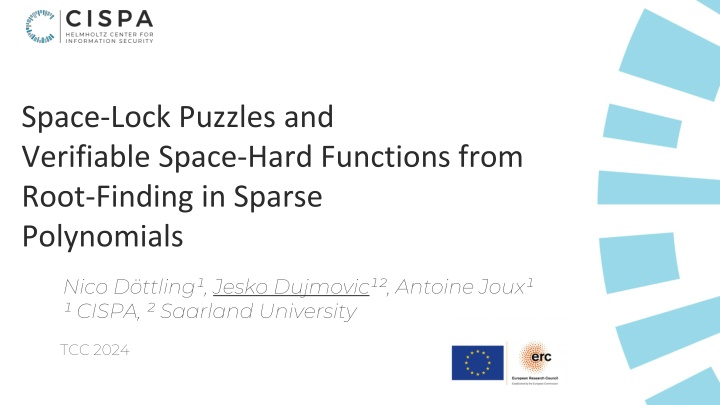
Resolving Space-Hard Function Challenges through Sparse Polynomial Techniques
Discover how sparse polynomials are utilized to address issues related to space-hard functions in various cryptographic scenarios such as Space-Lock Puzzles, Verifiable Delay Functions (VDFs), and Permutation Polynomials. Learn about techniques for resolving space-hardness problems, verifiable computation, and employing SNARKs for efficient verification.
Download Presentation

Please find below an Image/Link to download the presentation.
The content on the website is provided AS IS for your information and personal use only. It may not be sold, licensed, or shared on other websites without obtaining consent from the author. If you encounter any issues during the download, it is possible that the publisher has removed the file from their server.
You are allowed to download the files provided on this website for personal or commercial use, subject to the condition that they are used lawfully. All files are the property of their respective owners.
The content on the website is provided AS IS for your information and personal use only. It may not be sold, licensed, or shared on other websites without obtaining consent from the author.
E N D
Presentation Transcript
Space-Lock Puzzles and Verifiable Space-Hard Functions from Root-Finding in Sparse Polynomials Nico D ttling , Jesko Dujmovic , Antoine Joux CISPA, Saarland University TCC 2024
Verifiable Delay Function (VDF) Verifiable Delay Function (VDF) random x y, f(T, x) T f(x) is a VDF if I. y f(x) takes a long time to compute II. Produce a proof that y=f(x) III. is fast to verify Verifiable Delay Functions Boneh, Bonneau, B nz, Fisch 2
Permutation Polynomials Permutation Polynomials h(X) is a polynomial over finite field ? I. Permutation II. High degree III. Fast evaluation (e.g. sparse) Problems: I. With enough parallel processors linear algebra is fast II. Non-trivial high degree permutation polynomials with fast evaluation are hard to find f(X)=h (X) is a (weak) VDF I. Easy to check y=h (x) x=h(y) II. Seems inherently sequential Over ???, where ? = ?? and ? < ? and other f(x) is a VDF if I. y f(x) takes a long time to compute II. Produce a proof that y=f(x) III. is fast to verify h(X)=(?? ?? ?)(?? ??+?)?+((?? ??+?)2+4?2?)(?+1)/2 2?? Verifiable Delay Functions Boneh, Bonneau, B nz, Fisch; Exceptional polynomials of affine type Guralinck, M ller 3
Guralnik Mller Guralnik M ller h(X)=(?? ?? ?)(?? ??+?)?+((?? ??+?)2+4?2?)(?+1)/2 2?? Finding x s.t. h(x)=y is the same as finding root of h(X)-y If ? is the ? 1st root of unity in the algebraic closure there are ?,?,?,? in an extension of ??? s.t. ( (? + ??) ?) = ??3+ ???2+ ???+ ?? + ? ? ?? For any ? s.t. h(?)=? we get that ??3+ ???2+ ???+ ?? + ? = 0 Linear because ? ?? is an ?? homomorphism Exceptional polynomials of affine type Guralinck, M ller 4
How to Resolve Issues How to Resolve Issues Problems: I. With enough parallel processors linear algebra is fast II. Non-trivial high degree permutation polynomials with fast evaluation are hard to find Solutions I. Assume space hardness II. Use less structured polynomials (not permutation) random x Is space-hardness reasonable? Any algorithm for finding the root of h(X)-y treats h(X)-y it like a dense polynomial f(S, x) y, S Memory requirement grows with the degree 5
Sparse Polynomials in Verifiable Space Sparse Polynomials in Verifiable Space- -Hard Functions Hard Functions Problem with h(X) no permutation: I. For some y, there is no x s.t. h(x)=y II. There are x x s.t. h(x )=h(x ) Verify the computation of h (y) to prove uniqueness w/ little verifier space General-purpose SNARK works We use the structure of h and ~polynomial commitments for a tailor made SNARK 6
Time Time- -Lock Puzzles Lock Puzzles z Gen(T,m) Sol(z) T m Time-lock puzzles and timed-release crypto Rivest, Shamir, Wagner 7
Space Space- -Lock Puzzles Lock Puzzles z Gen(S,m) Sol(z) S m 8
Sparse Polynomials in Space Sparse Polynomials in Space- -Lock Puzzles Lock Puzzles Gen(m): Sample sparse polynomial h(X) w\ random constant coefficient Output z=h(X)-m Sol(z): Parse z as sparse polynomial g(X) Compute roots {m , ,m } of g(X) Which m to output 9
Sparse Polynomials in Space Sparse Polynomials in Space- -Lock Puzzles Lock Puzzles Gen(m): Sample sparse polynomial h(X) w\ random constant coefficient Sample key k ?) Output z=(h(X)-k, c) c Enc(k,m||0 Sol(z): Parse z as sparse polynomial g(X) and ciphertext c Compute roots {k , ,k } of g(X) ? for some m output m For i in [n] m Dec(k , c), if m =m||0 10
Space-Lock Puzzles and Verifiable Space-Hard Functions from Root-Finding in Sparse Polynomials Thanks!





















